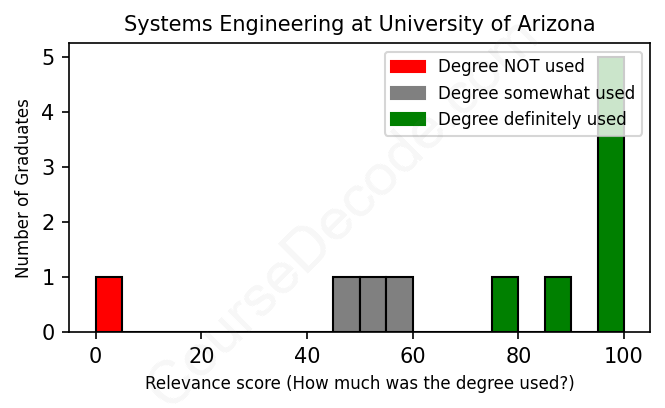
First, some facts. Of the Systems Engineering graduates from University of Arizona we've analyzed , here's how many have used (or NOT used) their degree in their career:

These are estimates based on AI analysis of 11 LinkedIn profiles (see below).
The verdict? Above average. Overall, with an average relevance score of 73%, Systems Engineering graduates from University of Arizona have a higher likelihood (+6%) of finding work in this field compared to the average graduate across all fields:
And for comparison, here's the chart for all profiles we've looked at across all degrees.
Also, after graduating, 36% of these graduates have pursued further education other than another Bachelor's degree (such as a Masters degree or other), compared to the average across all profiles of 35%. This suggests you may need more than just a Bachelors degree to be competitive as a Systems Engineering graduate.
See the details:
|
Relevance score: 59% We think this person has gone into a career only somewhat relevant to their degree. We think this person has gone into a career only somewhat relevant to their degree.
DEGREE INFOGraduated in 2019 from University of Arizona with a Bachelor's degree in Systems Engineering. No other secondary education since. JOB HISTORY SINCE GRADUATIONSoftware Engineer Caterpillar Inc. May 2019 - May 2020 Program Manager  Microsoft Jun 2020 - Mar 2022 Product Manager II  Microsoft Mar 2022 - Present ABOUTPassionate about learning the new aspects of technology and innovation. Seeking full-time positions in the field of engineering in order to utilize my university studies, challenge my analytical skills, and gain a valuable work experience.Three facts that may distinguish me from other candidates are:1. I have the ability to use my technical skills to solve problems with or without direction.2. I am passionate about being an active contributor and productive asset to any organization I am apart of.3. I have an extensive level of resilience and take commitments I make very seriously. |
The top 10 most common jobs done by the graduates we've analyzed (ranked most common to least) are:
After analyzing the job profiles of individuals who earned a Systems Engineering degree from the University of Arizona, it seems that many of them have found roles primarily in software development and engineering-related positions. Common job titles include Back End Software Developer, Sr .Net Developer, and various roles in applications engineering. These jobs often utilize skills like system design, programming, and problem-solving, which align closely with the knowledge gained from a Systems Engineering degree. However, there’s also a noticeable trend where some graduates have taken roles like Project Manager, Product Manager, or Associate Business Consultant, which may leverage some engineering principles but don’t focus heavily on technical skills day-to-day.
Overall, while many graduates have secured positions that are directly relevant to Systems Engineering, there are numerous examples of jobs that stray from that core technical focus. For instance, roles in project management often lean more towards organizational and communication skills rather than the engineering aspects learned in school. So, while there’s definitely a mix, it's clear that the Systems Engineering degree opens doors to both relevant technical jobs and broader positions that may not fully utilize the engineering skills acquired during their studies.
Here is a visual representation of the most common words in job titles for Systems Engineering graduates (this is across all Systems Engineering graduates we've analyzed, not just those who went to University of Arizona):

When looking at the career trajectories of graduates from the University of Arizona with a degree in Systems Engineering, it's clear that many of them are finding their way into solid roles in the tech and engineering sectors shortly after graduation. Many graduates kick off their careers as engineers, software developers, or in project management roles, typically landing jobs at recognizable companies like Microsoft, Honeywell, and General Motors. The first jobs often involve engineering or development tasks, which are pretty aligned with their degree. For example, recent graduates from 2020 onward are frequently taking on positions that help them build both technical skills and project management expertise—definitely a great start for their careers!
As we look further down the timeline—say, after five to ten years—these graduates seem to be advancing fairly quickly into more senior or specialized roles. They transition from entry-level positions into roles like product managers, project managers, or senior engineers at the same companies or move on to other established firms. For instance, a graduate just a few years out of school might move from being a software engineer to a product manager at a tech giant. Overall, the majority of these alumni appear to be on fruitful paths that leverage their Systems Engineering backgrounds, which is pretty promising for anyone considering a similar degree! There aren’t glaring signs of people taking unrelated career paths, so it's reasonable to say that this degree tends to set up graduates for good, relevant opportunities within the industry.
Hey there! So, a Bachelor’s degree in Systems Engineering, like the one at the University of Arizona, can be pretty challenging but also super rewarding. You’ll dive into a mix of math, science, and engineering principles, and you’ll often face heavy workloads with projects and group work. It’s definitely not a walk in the park; you need to be ready to tackle complex problems and think critically. Some folks find it tougher than other engineering degrees because it requires a good balance of technical skills and systems thinking. But if you’re passionate about the subject and willing to put in the effort, it can be a really interesting and fulfilling journey!
Most commonly, in the LinkedIn profiles we've looked at, it takes people 4 years to finish a Bachelor degree in Systems Engineering.
So, looking at these Systems Engineering grads from the University of Arizona, it seems like they're landing some pretty solid gigs, especially the older ones. The 2014 graduate, for example, has moved up through some well-known companies and gone from being an engineer to a senior developer, which usually suggests a decent paycheck. The 2019 graduate jumped straight into a cool program manager role at Microsoft, which likely comes with a nice salary too. Even the recent graduates from 2020 and 2022 are settling into roles that indicate they’re making good money for someone fresh out of school, especially those at established companies like Honeywell and Deloitte. Overall, it looks like most of them are on a good track financially, especially considering the tech industry tends to pay well!
Here is a visual representation of the most common words seen in the "about" section of LinkedIn profiles who have a Bachelor degree in Systems Engineering (this is across all Systems Engineering graduates we've analyzed, not just those who went to University of Arizona). This may or may not be useful:

Here are all colleges offering a Bachelor degree in Systems Engineering (ordered by the average relevance score of their Systems Engineering graduates, best to worst) where we have analyzed at least 10 of their graduates:
| College | Score | Count |
|---|---|---|
 University of Arizona University of Arizona
|
73 | 11 |
 United States Naval Academy United States Naval Academy
|
71 | 11 |
 United States Military Academy at West Point United States Military Academy at West Point
|
53 | 11 |